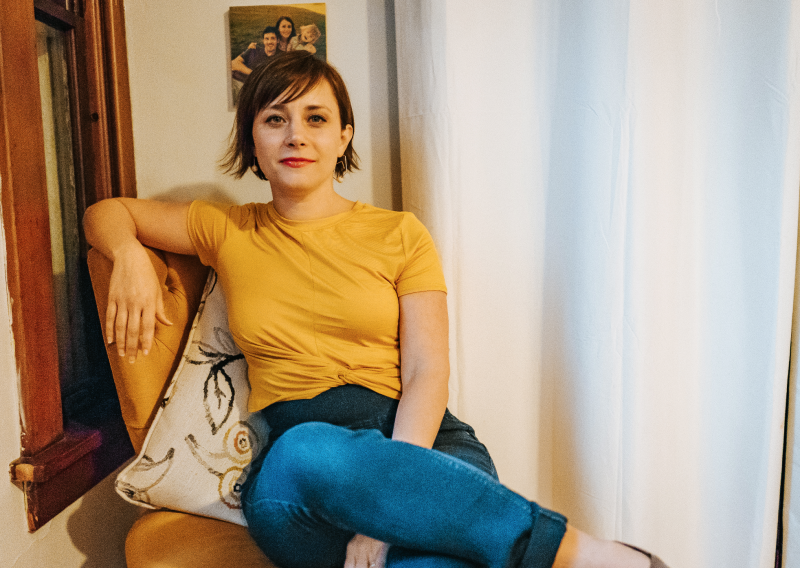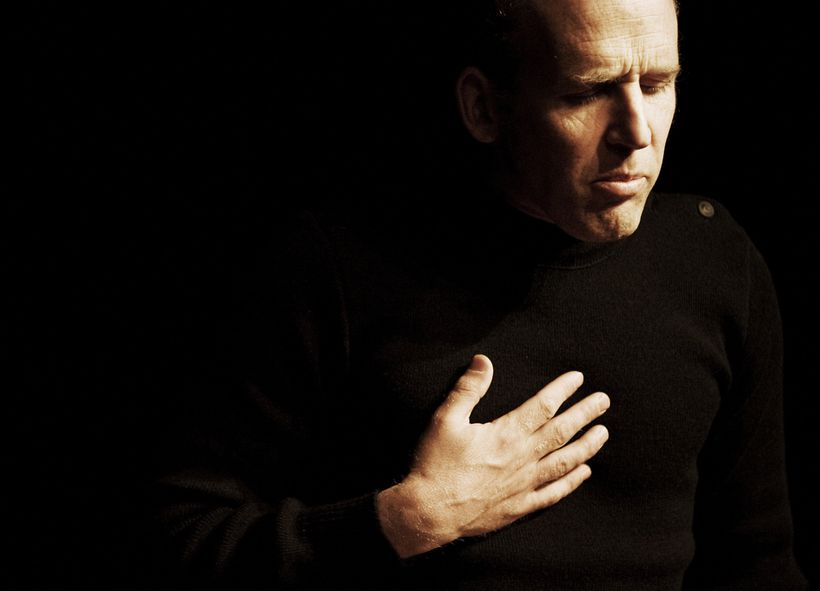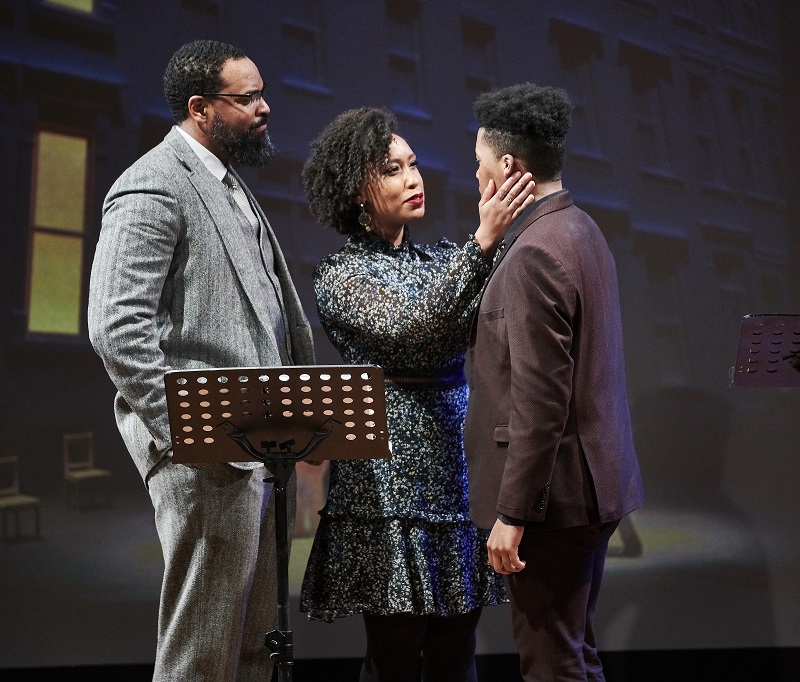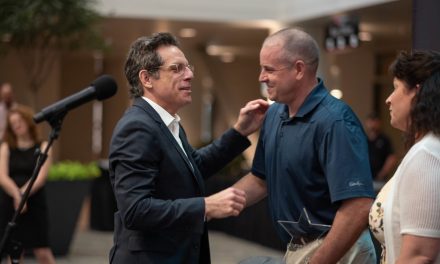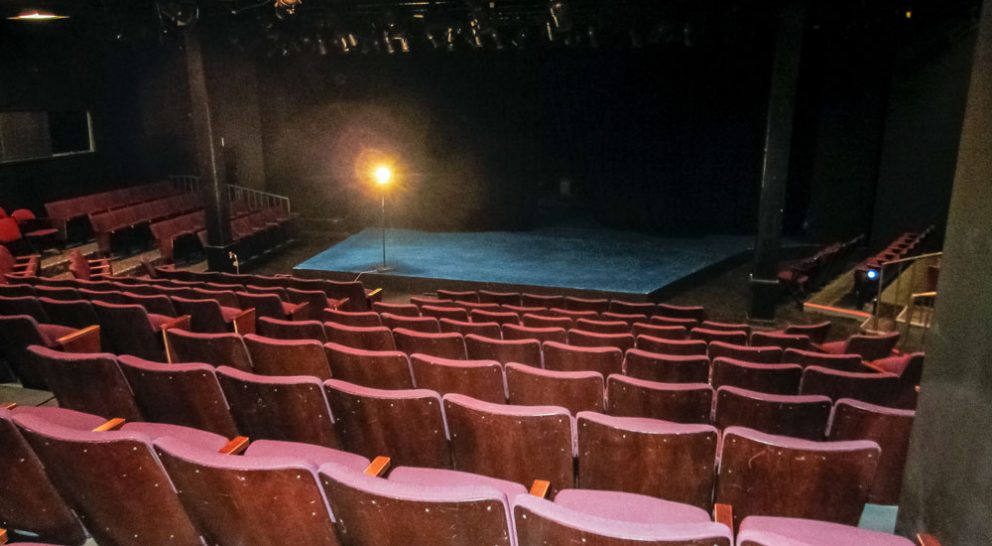This article first appeared in The Alt on March 7, 2018.
When arts and culture manager Victoria Kereszi of the Workforce Development Institute (WDI) reached out to Noelle Gentile with an opportunity to be part of casting for the feature film We The Animals, the Albany director and artist educator initially declined.
She had only just moved back to her hometown the year prior, after having spent 13 years in Brooklyn. She was pregnant, teaching full time between Albany School of the Humanities and Albany High School and was working on a play. Regardless, Kereszi introduced her to the film’s producers Christina King and Jeremy Yaches and the film team ended up visiting ASH to audition some of Gentile’s students. But they were having trouble getting work out of them. They didn’t know her students, Gentile observed, they couldn’t see their potential—so she jumped in.
“Can I try something?”
This is Gentile’s world. Helping students to dig up their potential and put it on display through their performances is where she thrives.
The next day, the film’s director Jeremiah Zagar asked Gentile to join the project as the acting coach. She agreed and roughly three years later, We The Animals—the indie film adaptation of Justin Torres’ autobiographical novel– triumphed at Sundance, earning the NEXT Innovator Prize. It’s been called “this year’s ‘Moonlight’” and has since been picked up by The Orchard for a theatrical release set for this year.
The coming of age film portrays a young boy, his two older brothers and their volatile parents in an intimate portrait of family that explores issues of race, economic status and sexuality. The casting team, led by Marlena Skrobe, had auditioned a couple thousand boys, looking for three who could act—but had never acted before—who looked like brothers and were proportionate in height. When they found Evan Rosado, Isaiah Kristian and Josiah Gabriel, Gentile began driving back and forth from Albany to New York City to train them with improv and acting games, exploring the script and their characters. By the summer of 2016, filming began in Utica.
“I’ve worked with a lot of young people for about 15 to 20 years in various settings and it’s kind of my jam. So, what I did with the boys was make sure that they felt comfortable. There was a lot of processing of emotions because they were between 9 and 12 years old and it was this totally new, overwhelming, wonderful, scary experience,” she explained. “You’re three kids on set with lots of adults…they were doing stuff that was very much out of their comfort zone.”
During filming in Utica, things got complicated. Gentile is the mother of two girls—3-year-old Lucia and 5-year-old Isla. When it became harder for her to be away for extended periods of time, she limited her onset time to three to four days a week. Co-screenwriter Daniel Kitrosser helped fill in time with the boys.
Often she would drive up to Utica early in the morning and work a 12-hour day with the young actors, helping them navigate their characters, the depth of their story and the relationship with each other on and off screen. Then, depending how things were at home, she would drive back to Albany or stay over in Utica.
“In the morning, we would look at the script together [to see] what we were going to shoot that day and some of it was some really intense stuff, like exploring sexuality,” she said. Rosado, who was 9 years old at the time, played a character who was discovering his homosexuality as he approached puberty. It was a lot to process, Gentile explained, and often if he had to shoot heavier scenes than his peers, the acting coaches would work with him alone. They practiced improv and imagined what events would have led his character to the specific moment he was about to perform.
“I’m a firm believer in expressing these things instead of compressing feelings.” Gentile said. “Just release what needs to be released. Especially when you’re working on something that’s such a raw look at family, that can be very triggering. Evan had to really dig deep. There was one scene where he had to really lose it and I said to him, ‘Have you ever like, yelled at your brother like that?’ He was like, ‘I’ve never yelled like that.’ For him, some of it was a stretch outside of his own lived experience.”
Sometimes, working through the young actor’s internal struggle went to odd places. One day, during a scene in a mud pit, he refused to get in and play. It was too cold and dirty. The crew dumped buckets of boiling water in the mud to warm it up as Gentile waded in with Rosado clinging to her back.
“We were sort of walking around and he told us that he had lost his sight, because he didn’t want to do it. He made up this whole thing how something had happened and he couldn’t see, so he was going around touching the crew’s faces and everyone sort of went along with it and eventually, he got into it,” she smiles, remembering. “Anything can come up. It’s one of the things I love about being on a film set, it’s all problem solving and it’s all relationships with people.”
Looking back, Gentile says, she feels lucky to have had the opportunity to use her talents as an artist and mentor at just the right time. “That film was the culmination of a lifetime of lots of different jobs, this is all of my skills from many different arenas,” she said.

Gentile fell in love with film while working with the Albany nonprofit film organization Youth FX, with whom she has worked for five years, doing collaborative film series and multimedia theater performances.
“One of the great things about it—working with Youth FX—is how respectful and empowering they are in their narratives and documentaries, because that’s not always the case, even when people are well-intentioned. I always know that our work is going to be presented in a way that is truthful and respectful, and ultimately empowering,” she said.
Gentile was co-artistic director with Bhawin Suchak of the massive Youth FX project A Piece of the Dream, which, with funding from WDI, culminated in a series of documentaries as well as an interactive website. The film team traveled to 10 regions of New York State to document working conditions and wage disparity.
“North Country was the hardest,” she said. There, the team met with a dairy farm worker who originated from Guatemala. At the time of filming, he had been on the farm for over eight years, working 12-hour labor-intensive shifts, six days a week. He leaves the farm only once a year, to go to Wal-Mart–but never more than that. People stare, they might report him.
“But we’re going to the grocery store buying our milk and cheese complaining that the milk is ‘X’ amount of money, not realizing the impact on dairy farm workers, or knowing what that looks like,” Gentile said. “It was a really intense experience, but a lot of what we witnessed across the state was very inspiring. A lot of people were fighting the system by creating their own things.”
The project also took the form of an immersive theater piece at the Albany Barn. Audience members made their way through several rooms of three different floors where film, photography and installation art were on display along with spoken word, dance and performance pieces.
“It deepened my understanding of the reality of economic and racial oppression,” Gentile said. “There is such a divide in this area.… and people are out there moving on with their lives with no true understanding of how people are living right next door to them. The minimum wage is just straight up not livable. To see what that does to people’s quality of lives, that immersive theater experience was sort of transformative personally.”
Through work with Youth FX, WDI and the Albany High School theater program, Gentile has been able to join her love for the arts of film and theater with education and social justice.
She is a full-time Albany City School District educator, teaching theater at ASH and advanced theater at Albany High School–partnering the two through the Theatre Mentoring Program, in which high school students lead the elementary students in acting and storytelling practices. The partnership brings collaborative works like “The Identity Project” to life. Under the guiding eyes of Gentile and fellow AHS teachers Ward Dales and Gregory Marsh, more than 65 students have shared how they see themselves through their community and individual eye.
“We’re creating plays on identity that explore bullying and ‘isms’ that people might face and we’re taking those the middle schools and elementary schools and the international school,” Gentile explains. “It’s really beautiful. We’ve had a couple performances already and it’s really powerful when you let young people lead, and also for students to have people teaching them that are students of color because there are so many white teachers.”
Gentile has also been able to orchestrate a number of theater pieces as teaching artist for the Capital Repertory Theatre as well as her collaborations with community and leadership organizations.
Through Unseen Theater, presented by WDI, Gentile conceptualized “On Her Shoulders”, in which her high school students performed the experiences of veteran women who shared stories of rape, wartime stress and trauma.
In “Which Way Is Home” her students performed individualized pieces addressing the struggle to belong, with help from the National Coalition Building Institute.
“We explored the concept of home told through the perspective of immigrant and refugee students and black students who have grown up in Albany and feel a loss of home because of systematic racism and police brutality,” Gentile explained.
With Arts, Letters, Numbers in Averill Park, she and Dales recently led a workshop on Information Poverty in collaboration with UNICEF to explore ways that access to communication and informational tools improve the lives of children in poverty.
“What I’ve honed my skill of doing is just sort of making space and getting out of the way for people to share their own stories,” she said.
However, in the fall of 2016, she and her Youth FX colleague Michael Mejia set out to do just the opposite of that. They were going to make a film that turned the camera on Gentile–and not just Noelle but her family, her young daughter Isla and the diagnosis that, for so long, felt just out of reach.
Isla has severe epilepsy and autism, but was only diagnosed in 2016. For those four long years, her parents researched, meeting with doctors in Albany and Boston, looking for an answer. At one point Isla was hospitalized for roughly 70 days in a two-year period.
One day Mejia called Gentile. “When’s the next time you’re going to Boston Children’s Hospital?” he asked. “Can I come?”
Gentile was surprised. No one had ever asked to come along for an appointment. “Sure,” she said. “As a friend or as a filmmaker?”
“Kind of both.”
The soon-to-be co-directors conceptualized the project while traveling together during the filming of A Piece of the Dream, when Gentile shared a vision she had about Isla only two days before their trip.
“I had this realization that nothing mattered but how I took care of her. I was responsible for this little soul and it didn’t matter if her journey looked like anybody else’s or what her life was like,” she said. “Sometimes I think the pain of it is, ‘Is she gonna have friends?’ Envisioning her life was really scary for me and still is sometimes. I feel really protective and worried. It sort of cleared away, in this moment I had, this minutiae that you often get caught up in.”
Gentile and Mejia worked on the film over the course of the year, just checking in and letting things happen. Mejia shot footage at the hospital and in the family’s home. Gentile filled in the spaces with home video and cell phone footage.
“Sometimes we would be in the hospital and I’d take out my cell phone and film. Even that was therapeutic because we’d be in the hospital forever and it would help me reframe stuff and think about it from a different perspective, almost pull out of the pain and intensity of that experience and sort of look at it a different way,” she said.
“He really gave us the gift of creating a space for us in which we didn’t feel judged,” Gentile said of working with Mejia. “He never made me feel like I couldn’t go to whatever space I needed to go to in order to do what I needed to do.”
For the family, there was a lot of places to go. There was years of feeling unsure and terrified of the lack of answers for their daughter’s well-being.
“Our experience has been really intense,” she explained. “Like most parents who have a child with a disability or a medical condition, you’re like, ‘This was not at all what I expected. This was so much more intense and there’s no road map for this.’”
Gentile remembers watching Parenthood with her husband Nate, a show depicting four siblings and each of their families. One of the sibling’s children has Asperger Syndrome. Watching the parents struggle made Gentile cry, but it also made her feel normalized. Isla hadn’t been diagnosed with autism yet, but her mother already knew. She could feel it.
Making the short film was a form of therapy for her that Gentile says she may have never found through traditional means. Acting out the ways that she and her family had dealt with the unknown, the way she and her husband work to communicate with their daughter. It was a relief.
“A lot of our life, it’s like she has so many meds on her and we’re just trying to clear that out to access her. The meds make it hard for her to communicate. Or, there’s even the feeling of total terror when she was in ICU,” she said.
“Once I got past whether or not we should tell our story, it was such a release to be able to do it. I think so often, because it’s so hard to articulate the experience, because it’s so complicated, you wind up struggling to communicate it to someone,” she added. “In making a film, it’s like a hand out to say, ‘Yeah, this is where we are’ and maybe to dispel some of the fear that people have of asking questions or trying to understand.”
The medium of film also helped to protect her daughter’s privacy. There was no need to bare it all to prove a point. Their experience was painted in nuanced moments, the things left unsaid.
“There’s stuff that is just really hard that I can’t share and that’s the beautiful thing about making a movie, there aren’t all of the words there. Some of it is being indicated without being incredibly explicit,” she said.
The 7-minute resulting short, “Between Us”, is a beautiful and moving letter from mother to daughter. It’s the first, she hopes, of an episodic series told from each family member’s perspective. Gentile and Mejia have submitted it to several film festivals.
“There’s not a lot of representation of families going through journeys like ours and that kind of goes back to my core value as an artist,” she said. “It’s really important to see representation of yourself in order to feel empowered in the world.”
The experience of getting back in front of the camera was a lesson Gentile has brought back to her teaching role and ongoing projects. In “Between Us” she was able to reacquaint herself with the vulnerability of communicating one’s own experience as well as, in the role of director, to be careful about not putting your own lens onto someone else’s story.
“I’m always being very reflective of my white privilege and making sure that I’m constantly checking myself and making sure that the narrative being told comes from whatever artist or student I’m working with, the story that they want to tell,” she said. “We’re talking about really vulnerable stuff like identity and what racism or oppression—or any sort of identity oppression—somebody experiences. It’s really important to, when you’re making art about it, let the person who is sharing their lived experience feel empowered.”
Gentile is adamant about using her role as a director, educator and mom to empower those around her, even if outside forces try to take that power away. As a woman making waves in film and theater, it’s something she has dealt with on her own. With the building power of Black Lives Matter and the #metoo movement, there has been an inspiring “collective awakening” that has helped her take her own power back.
“I’m raising two little girls, that identify as girls, and I’m a teacher, so these people are constantly watching me—and watching things you don’t realize, like, ‘What are your boundaries?’ Showing my students that I take care of myself, speak up for myself, those messages that I’m not explicitly saying are really important,” she said.
“My parents raised me to think that I could do whatever I wanted, which is awesome, but it wasn’t true really. I think it took me a long time to understand that and in my misunderstanding of that, I didn’t develop the tools to speak up for myself when a lot of microaggressions were happening,” she explained.

“In the last couple of years, I’m always working to be a better ally and I’ve become a very fierce advocate for Isla. If it comes to Isla, I have no problem saying or doing whatever. But I’ve never been that for myself.” I think in watching the patriarchy get smashed, it’s made me very reflective of all the little ways that I’ve constantly said, ‘Is this OK? Are you happy with me? Is this comfortable?’ People pleasing. At first it was really scary but with this collective of women doing it together, it feels less scary.”
As her students learn to communicate their identity and share their stories with each other, Gentile has watched some of society’s most harmful constructs shake and begin to dismantle.
“I think we’re at a really scary time but also a really critical, potentially exciting turning point where a lot of space is about to be reclaimed. I feel like we’re seeing the dying battle cry of white male patriarchy. You’re seeing this beautiful uprising of people saying, ‘That’s enough of that way of doing things,’” she said. “What people do in small spaces… is just as important, in a totally different way, as a massive march. Those conversations are where change happens. Part of it is just having an investment in each other. Sometimes we see people who do not feel like it’s their issue.”
One way to approach change on a small scale, Gentile believes, is through communicating our own stories and taking the time to recognize and explore someone else’s.
“The thing that I love about film and theater is it asks us to listen and to pay witness to someone’s lived experience that may be different from our own. And in listening and paying witness we begin to build bridges, we begin to heal.”

